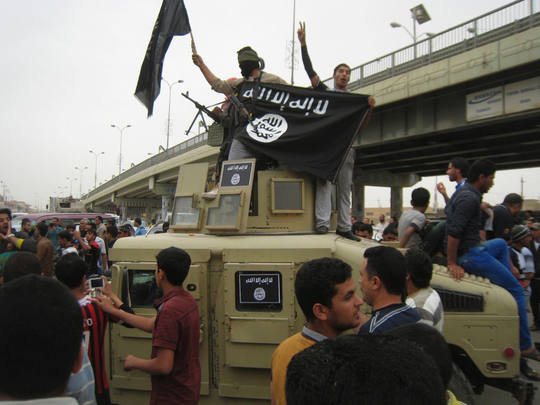
The free world is at war with Daesh (the self-proclaimed Islamic State of Iraq and the Levant). In the same time, there is no more an Iraqi state; no more a Syrian state; but a new nameless “State” that has a government. Even though it is a band of criminals; with a capital in Raqqa; it levies taxes and leads an army: We mean, the territories occupied by Daesh. Since it is common sense to say that the people are better governed by traditional states than by rogue entities and lustful psychopaths, what is going on in the former Mesopotamia cannot be left unattended, unless one wishes to see the whole Middle East and soon after, the rest of the world, fall into an irrecoverable precipice.
Referring to history, one should remember that decisions that led to the present territorial organisation are not carved into stone. Good or bad, the system set up by the Sevres Treaty, formalising the 1916 Sykes-Picot Agreements, addressed situations that have lasted for hundred years; and despite the creation of the state of Israel and its continuing uncontrolled expansion, the international community felt it was satisfactory enough not to change anything. But the growing sectarian feuds and the spread of terrorism have become a game changer. The enemy is now knocking at everyone’s doors and no state is immune.
The on-going burst-out of Syria, the incompetence of the succeeding governments in Iraq and, above all, the unbelievable expansion of Daesh have changed everything — something everyone should take into account now that a key actor, Iran, is no more to be ostracised and may play a positive role. To sum-up, there is a consensus among the populations to live safe and not be hit anymore by terrorism, which should consequently be fought off combatively. Second, organised states have appeared to have the best structures to achieve such goals. Third, the UN has proved to be too often inefficient, while regional military organisations are unable to achieve enough consensus. As for the Arab League decision not to send Arab troops to Libya and Saudi thoughts about setting up a new regional military alliance, which is a long process, it all confirms that time has come for intervening on the ground. Attacking organised states, as the West did directly in Iraq and indirectly in Syria, proved to be insane. Staying inactive now would be shameful.
In a first step, an international conference should be held, to be attended by those states who have an army able to join a coalition. Its agenda would be straightforward: 1. Re-designing Iraq into several entities with the scope to protect the diversified populations — a united Iraq achieving the goal would have been preferred, but Iraqis themselves proved they were unable to reach it. 2. Reshaping Syria along similar lines and achieving a similar goal — unless one believes one camp may win over another or communities are able to live again together after what occurred. For which, credit can indeed be given to French President Francois Hollande, declaring that the first task in Syria is “to neutralise Bashar Al Assad, offer strong guarantees to the whole members of the moderate opposition (...) and preserve the state structures and the integrity of Syria”. 3. Being truly at war with Daesh, since it is a threat to the whole international community. This means bombing their forces wherever they are, irrespective of the former regional frontiers; and engaging troops on the field, since air-strikes alone never allowed any war to be won.
Once again, alternative routes have proved to be inefficient and it is not by chance that a US general, who just retired from the US headquarters in Iraq, also expressed similar views.
Is reshaping the region a chimera, when the number of refugees keeps growing so dramatically? When will the states decide to take up their responsibilities? Is not doing anything successful — some new form of diplomacy?
Moving ahead requires genuine political leaders: Historical figures with political vision, strategy and a willingness — something not really on display these days. Not those shabby players making their own cooking in the back kitchen of their rented houses; not those political dwarfs taking-up commissions or consultancy fees once they left their offices. One may think it is a good idea to start fighting the peripheries. It is not correct. The enemy should be struck right at the heart, irrespective of the frontiers.
Luc Debieuvre is a French essayist and a lecturer at Iris (Institut de Relations Internationales et Strategiques) and the Faco Law University of Paris.











